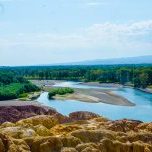By Xuefei Chen Axelsson
Stockholm, May 31(ChinaEuropeDialogue) –The high-level UN meeting Stockholm+50 will be held in Stockholm, Sweden on 2–3 June 2022. The meeting will celebrate the 50th anniversary of the first UN conference on the environment, assess the environmental actions taken in the past 50 years and present concrete recommendations to improve the state of the environment.
The Conference on the Human Environment in Stockholm in 1972 led to the establishment of the UN Environmental Programme UNEP and several international agreements on the environment. The conference was a key milestone for the development of international environmental administration and cooperation, and the establishment of the Environmental Programme is celebrated annually by the World Environment Day on 5 June.
The Stockholm+50 to be held during the 50th anniversary year will bring together state leaders, ministers, various stakeholders and companies to discuss a more sustainable future and propose concrete measures to improve the state of the environment.
“Environmental problems do not respect national borders, which is why we must find solutions together. For 50 years, the UN Environmental Programme has promoted international cooperation to solve the most important environmental challenges. The journey has led to significant achievements, such as those in preventing ozone depletion. Now we need international cooperation more than ever before to be able to halt biodiversity loss and the climate crisis,” says Minister of the Environment and Climate Change Emma Kari.
Finland has important role as dialogue chair and leader in sustainable development
Stocholm+50 is composed of four plenary meetings and three leadership dialogues. The meeting will be hosted by the Minister for Climate and the Environment of Sweden Annika Strandhäll and Cabinet Secretary for the Ministry of Environment and Forestry of Kenya Keriako Tobiko, according to news reaching here from the organizing committee.
Leadership Dialogue 1 will focus on renewing our relationship with nature, on sustainable production and consumption, and on proposals for solutions to problems related to pollution. Justice and gender equality will be taken into account in all development proposals. Leadership Dialogue 2 will discuss ways to achieve a sustainable recovery from the COVID-19 pandemic. Key issues in this regard include new innovations and technologies and more effective international cooperation.
Finland’s representative Minister Emma Kari has been invited to chair Leadership Dialogue 3 together with Egypt. The dialogue will take place on Friday 3 June, and it will focus on funding the green transition and on sustainability change throughout society.
“The world still supports fossil solutions more than the green transition. In the dialogue, we want to highlight practical solutions to change this. It is most valuable that Finland, in its role as a co-chair, will be able to lead the way in sustainable development in the international community and that we can share our experiences of, for example, favouring clean solutions in taxation and boosting the green transition with financial support,” Minister Kari says.
Finland and EU aim to increase funding for sustainable development and phase out harmful support
Finland will be represented at the meeting by a broad-based delegation composed of experts from ministries, research institutes and organisations and of public officials, led by Minister of the Environment and Climate Change Emma Kari. To make sure that young people have a strong voice at the meeting, the Finnish delegation also includes seven youth delegates.
Finland wants to promote solutions that respond to key environmental challenges and encourage a green transition throughout society by means of e.g. the circular economy. For Finland, global justice based on the UN Human Rights Council Resolution on the right of every person to a clean and healthy environment is a high priority. The aim is to further promote the participation of especially young people and indigenous peoples in decision-making.
Based on the discussions between the decision-makers, the host countries of the meeting, Sweden and Kenya, will prepare a summary that will serve as the final document of the meeting. There will be no actual negotiations at Stockholm+50, but Finland has been active in drafting the EU’s common messages for the meeting. The EU intends to highlight the integration of natural capital into the national accounts and strengthen the linkages between climate and biodiversity funding. The key objectives also include phasing out the types of support that are harmful to the environment, measuring the financial risk related to biodiversity loss, and sustainable consumption and production.


